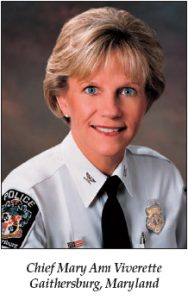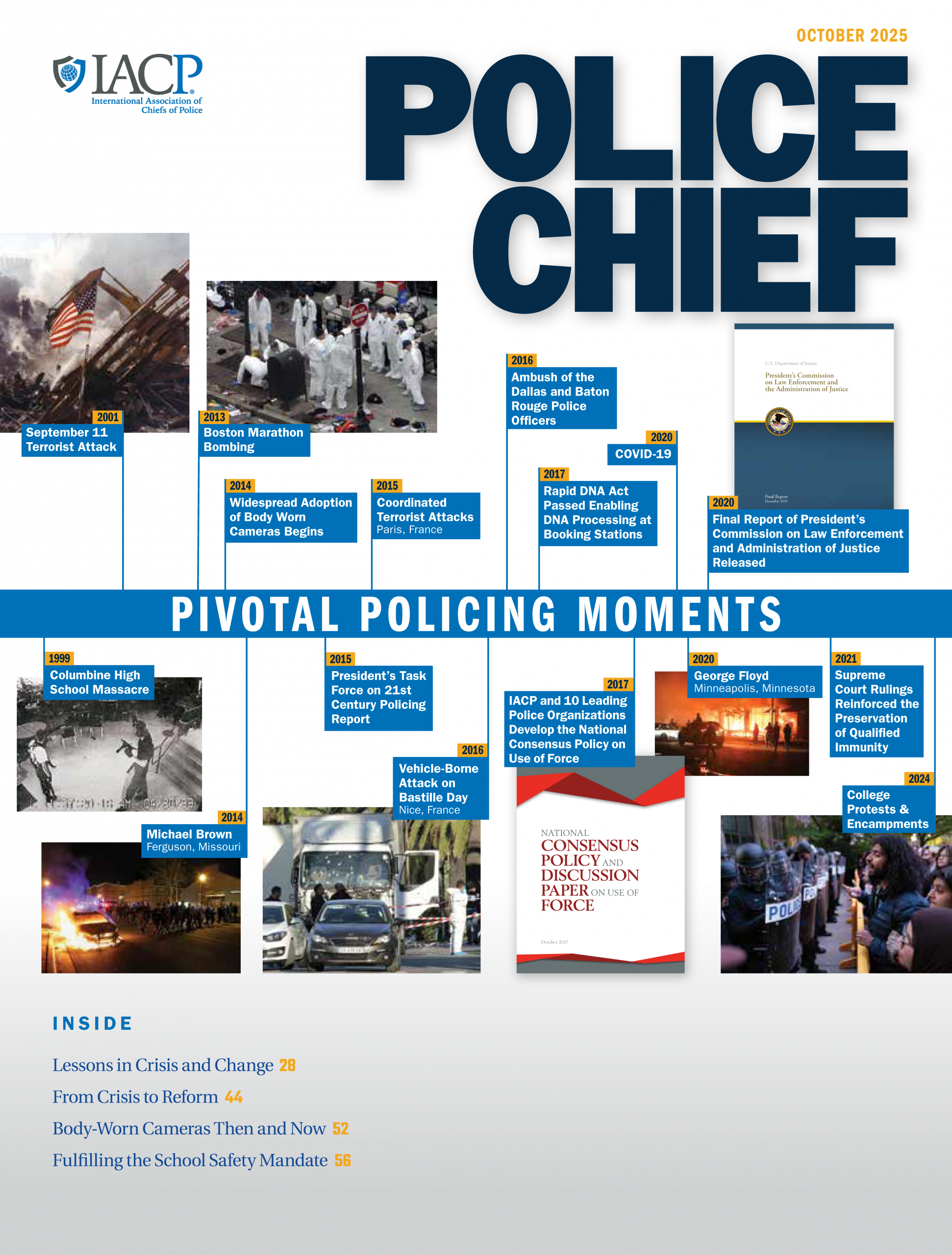 During the week of May 14, National Police Week, people across the United States will honor the police officers who have died in the line of duty. During this period, members of the law enforcement profession will unite with the survivors and other members of our communities to remember and pay tribute to those we have lost. In 2005, 155 law enforcement officers across the United States were killed in the line of duty.
During the week of May 14, National Police Week, people across the United States will honor the police officers who have died in the line of duty. During this period, members of the law enforcement profession will unite with the survivors and other members of our communities to remember and pay tribute to those we have lost. In 2005, 155 law enforcement officers across the United States were killed in the line of duty.
National Police Week also provides us with the opportunity to reflect upon our duty as law enforcement leaders to ensure the safety of our officers and our obligation to ensure that the sacrifices our fellow officers make are recognized and appreciated by the citizens and communities they serve.
In light of these important responsibilities, I would like to highlight two programs currently under way at the IACP. One, the SafeShield Project, focuses on our responsibility to protect our officers. The other, the Survivors Education Law Enforcement Trust, managed by the IACP Foundation seeks to assist the families of those who have been wounded or killed in the line of duty.
Project SafeShield
Although much has been done to give law enforcement officers more nonlethal force alternatives and first responder protective gear, less has been done to protect line officers in their daily jobs. Facing the problem of duty injuries, the IACP Division of State Associations of Chiefs of Police (SACOP) launched a comprehensive study designed to determine how personal protective garments and equipment can be integrated to form a personal protective system.
SafeShield is a long-term project that will examine existing and cutting-edge technology for the purpose of creating a personal protective system for the police officer of the future. The overall goal of the SafeShield project is to provide total police protection by creating a uniform that will provide the officer with a protective structure incorporating communication, information, and environmental protective systems.
In addition to considering uniform improvement, the SafeShield Project will review and recommend sound procedural policies, and advocate increasing and improving training, with the goal of sending all officers home safely every day.
This noble goal reflects the belief that we, as law enforcement leaders, must not, and cannot, accept the proposition that accidents, injuries, and deaths are a necessary reality of the law enforcement profession. The SafeShield Project is committed to the ideal that the only acceptable operating philosophy for a police chief is zero officers killed or injured.
Survivors Education Law Enforcement Trust
Tragically, despite the ongoing efforts of Project SafeShield, serious injuries and deaths continue to plague the law enforcement profession. During the last 10 years, 1,635 law enforcement officers have died in the line of duty.
Each death devastates an officer’s family, friends, and coworkers. The well-being of the survivors is dependent upon not only the immediate response of the department but also its continuing efforts in the weeks, months, and years that follow.
We, as leaders in the law enforcement community, have an obligation to help ensure that families of our fallen comrades are looked after. To help meet this need, and meet our obligation to our colleagues who have made the ultimate sacrifice, the IACP Foundation established the Survivors Education Law Enforcement Trust (SELECT). The Select program provided college and vocational and technical school scholarships to the family members of law enforcement officers who have been killed or permanently disabled in the line of duty.
Nothing can make up for the tragic loss of a loved one, but it is our hope that a pro-gram such as SELECT will allow survivors a greater sense of security by knowing that they can receive support to pursue an education.
Apart from the scholarship program, the Select program will also encompass the IACP Foundation Educational Research Center as well as the Law Enforcement Scholarship Clearinghouse. The research center will help students find additional financial support for higher education, and the clearinghouse will provide services to other organizations who wish to endow scholarships that will, in turn, be administered by the Select program.
Further information about the Select pro-gram and other IACP Foundation programs can be obtained by visiting the foundation’s Web site, (www.theiacpfoundation.org), or by calling the foundation’s office at 800-THE-IACP, extension 367.
National Law Enforcement Officers Museum
Finally, I would be remiss if I did not mention the effort under way to construct the National Law Enforcement Officers Museum. This effort, spearheaded by the National Law Enforcement Officers Memorial Fund (NLEOMF) and strongly sup-ported by the IACP, is designed to serve as a counterpart to the National Law Enforcement Officers Memorial in Washington, D.C.
The museum will serve as a national center for information on law enforcement history and will also include a research repository devoted to promoting law enforcement safety. The NLEOMF plans to collect all available information on issues ranging from the importance of high-speed driver training to the latest developments in nonlethal police weaponry to reasons why our officers should wear soft body armor. I encourage all IACP members to visit the (www.nleomf.org) for more information on the museum and how you can help bring it to reality.
The presence of the memorial and the museum will ensure that the life and sacrifice of every officer slain in the line of duty is never forgotten. It is a way of offering the survivors of fallen officers hope, healing, and the assurance of knowing their loved one’s sacrifice was not in vain. And it will also serve to drive home the message that is inscribed upon the walls of the memorial: It is not how these officers died that makes them heroes; it is how they lived.


